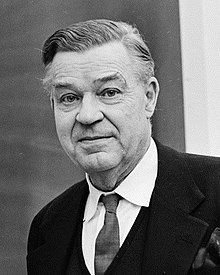Gunnar Myrdal
| Gunnar Myrdal | |
|---|---|

Gunnar Myrdal in January 1964
|
|
| Born | Karl Gunnar Myrdal 6 December 1898 Gustafs, Dalarna, Sweden |
| Died | 17 May 1987 (aged 88) Danderyd, Sweden |
| Nationality | Swedish |
| Fields | Economics, Politics, Sociology |
| Institutions | NYU, |
| Alma mater | Stockholm University |
| Doctoral advisor | Gustav Cassel |
| Doctoral students | Rudolf Meidner |
| Known for |
Monetary equilibrium, Ex-ante, Circular cumulative causation |
| Influences |
Knut Wicksell John R. Commons |
| Influenced | Ha-Joon Chang |
| Notable awards |
Nobel Memorial Prize in Economic Sciences (1974) Bronislaw Malinowski Award (1975) |
| Spouse | Alva Myrdal (m. 1924) |
Monetary equilibrium, Ex-ante,
Karl Gunnar Myrdal (Swedish: [ˈmyːɖɑːl]; 6 December 1898 – 17 May 1987) was a Swedish economist, sociologist and politician. In 1974, he received the Nobel Memorial Prize in Economic Sciences with Friedrich Hayek for "their pioneering work in the theory of money and economic fluctuations and for their penetrating analysis of the interdependence of economic, social and institutional phenomena." He is best known in the United States for his study of race relations, which culminated in his book An American Dilemma: The Negro Problem and Modern Democracy. The study was influential in the 1954 landmark U.S. Supreme Court Decision Brown v. Board of Education. In Sweden his work and political influence were important to the establishment of the Folkhemmet and the welfare state.
Myrdal was born on 6 December 1898 in Gustafs, Sweden, to Karl Adolf Pettersson (1876–1934), a railroad employee, and his wife Anna Sofia Karlsson (1878–1965). He took the name Myrdal in 1914 after his ancestors' farm Myr in Dalarna.
There is a possibly apocryphal story about an interaction between him and Gustav Cassel, where Cassel was reported to say, "Gunnar, you should be more respectful to your elders, because it is we who will determine your promotion," and he replied, "Yes, but it is we who will write your obituaries."
Gunnar Myrdal graduated with a law degree from in 1923 and a doctorate in economics in 1927. In 1919, he met Alva Reimer, whom he married in 1924.
In Gunnar Myrdal's doctoral dissertation, published in 1927, he examined the role of expectations in price formation. His analysis strongly influenced the . He built on Knut Wicksell´s theories of cumulative process of endogenous money, stressing the importance of Knightian uncertainty and Ex ante and Ex post expectations role in the economic process.
...
Wikipedia
